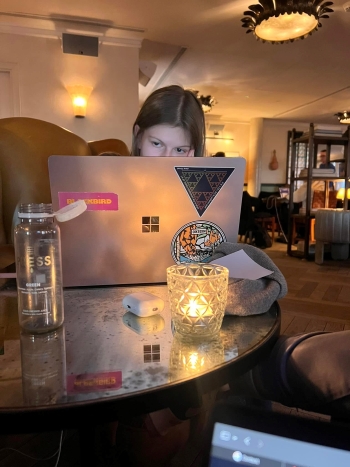Building, Learning, Leading: Lessons from Our Chief Student Entrepreneur

University is one of the few places where studying and building new ideas happen side by side.
Whether you're starting a business, leading a project, or simply looking to bring fresh ideas to life, the ability to balance learning, leading, and creating is a skill that will serve you for years to come.
Each month, we’ll catch up with our Chief Student Entrepreneur, Yarra Kiseleva, to hear firsthand about her journey as a student, founder, and curious mind.
This month, Yarra shares reflections from Semester 1 — across the classroom, startup life, and lessons learned along the way.
1. Campus Life is Back in Full Swing
The first few weeks back for semester were a whirlwind. Lecture halls buzzing with discussions, libraries packed with determined studiers, and the campus coffee shops once again serving as unofficial headquarters for impromptu study and social groups.
What’s been particularly interesting this semester is the shift in teaching approaches that I have noted. Several professors I am collaborating with have introduced more interactive methods, moving away from traditional lectures to incorporate real-life case studies of UQ-founded companies, simulations, and collaborative projects — something I’ve really enjoyed helping make possible within both the Business and Computer Science courses at UQ.
I also appreciate the little things, like my Law professor stopping mid-lecture to tie theoretical ideas to the UQLS, making concepts that much more memorable.
Learnings:
- Real-world case studies and simulations make learning far more memorable and engaging.
- Connecting theory to real-world university activities (like UQLS) strengthens understanding.
- Campus life feels vibrant again, with student organizations recruiting and Ventures' calendar in full swing
2. A Corporate Law Concept That Stuck: The Corporate Veil
One of the most fascinating concepts I've learned this semester is the corporate veil and its historical development, which I explored in Corporate Law. This principle — that corporations are separate legal entities distinct from shareholders — has profound implications for how business is conducted globally.
The concept’s historical evolution is particularly intriguing. What started as community resource-pooling for ventures (like trading expeditions) gradually evolved into one of modern capitalism’s foundation stones.
As The Economist noted in 1926, the inventor of limited liability deserves “a place of honour” alongside the pioneers of the Industrial Revolution.
From Roman tax-collection operations to 14th-century peace-guilds, the earliest corporate associations show how legal frameworks evolved to serve both public and private interests. The East India Company (chartered in 1600) marks a turning point, allowing noblemen, gentlemen, shopkeepers, widows, orphans to invest collectively — a radical concept at the time.
What’s particularly thought-provoking is that corporations were initially seen not just as profit vehicles but as public agencies responsible for managing trade and broader societal outcomes.
Learnings:
- Limited liability encouraged global investment and risk-taking.
- However, it also created tensions we still grapple with — particularly around how corporations balance private profit with public responsibility.
- Legal structures like the corporate veil are products of centuries of economic, social, and political change — not static systems.
3. Managing Time, Energy, and Focus
Navigating both academic responsibilities and startup leadership has been challenging but immensely rewarding.
The biggest lesson I’ve learned this month is the importance of intentional time blocking and clear boundaries between different areas of focus.
Top tips that have worked for me:
- Take on tasks you’re genuinely interested in. It’s so much easier — and less draining — this way.
- Become busier (but not overwhelmed).
- It sounds counterintuitive, but productivity peaks when you have enough to do.
- Too little leads to procrastination; too much leads to burnout.
- Structure your days.
- I work better in multi-hour blocks and focus on different subjects each day, rather than switching constantly.
One of the most rewarding aspects is seeing how these skills cross over:
- Analytical thinking developed in class sharpens decision-making as a founder.
- Startup challenges give richer, real-world perspectives on lectures — especially in Corporate Law and Computer Networks.
Looking Ahead
As I look ahead to the rest of the university year, I'm excited to continue nurturing both my academic foundation and my entrepreneurial ambitions.
Being a student provides the perfect laboratory for this dual development — offering structured learning and the freedom to innovate.
